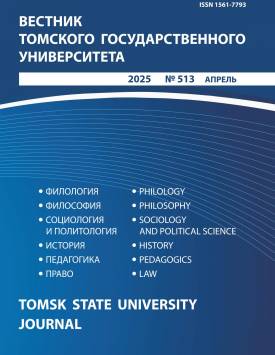The reverse meanings of titles in Anton Chekhov's prose of the 1880s
The first decade of Chekhov's work was experimental. In the 1880s, Chekhov's works, an important artistic strategy of which was the juxtaposition of title and plot, appeared, and this feature of his works significantly diverges from the usual ideas that the title of a work must necessarily correspond to its content. Based on the material of Chekhov's short stories "A Story That's Hard to Name" and "An Anonymous Story", it is shown that in some cases he consciously demonstrates a complex author's reflection on how to name a work. The problem of the specifics of Chekhov's title complexes determined the aim of the work: the description of an original phenomenon of the writer's poetics - the "reverse meanings" of his works' titles. A special study of the "reverse meanings" of Chekhov's titles determined the scientific novelty of the work. The research material was the writer's short stories of the 1880s, such as "A Letter to a Learned Neighbor" (1880), "The Good Friend" (1882), "An Idyll - But Alas!" (1882), "Grateful" (1883), "A Defenceless Creature" (1887). "A Letter to a Learned Neighbor" is Chekhov's first printed story. Its text is organized by two approaches that are difficult to combine in the image of the writer: science and psychology of a poorly educated person. Their opposition not only caused the comicality of Chekhov's story, but also manifested itself in the reverse meaning of its title: this is a comically "unscientific" letter to a "learned neighbor". In "The Good Friend", the author's language game in its title plays an important role: in Russian, the concept of a "good friend" is ambiguous, it can mean both an old acquaintance and actually a kind person. The "good friend" of the main character, as if out of the kindest feelings, humiliated him, exposed him in the unsightliest way. "An Idyll - But Alas!" and "Grateful" are devoted to the theme of human gratitude, which turns into absolute ingratitude. The name of the first story is openly organized by the "reverse" principle, in it the "idyll" between an uncle and a nephew turns into "but alas!" when the nephew found out that his uncle had lost all his money. The second story also describes the relationship between a poor young man and his wealthy boss, and in it the young man's gratitude for the help he received suddenly turns into an effort to seduce his benefactor's wife. In "A Defenceless Creature", the main character constantly claims that she is "defenceless", but in fact she terrorizes everyone she meets, turning them into "defenceless creatures". Thus, such principles and techniques of organizing a complex "reverse" relationship between the title of a work and its plot as focalization, devaluation, doubling of the plot, and psychologism are revealed. The principle of the "reverse" meaning of the work's title is due to Chekhov's ideas about the need for the author's modeling of the reader's perception of a work in all its ambiguity and semantic completeness. The author declares no conflicts of interests.
Keywords
A.P. Chekhov, short stories of the 1880s, headline complex, narratologyAuthors
| Name | Organization | |
| Al-Abboodi Muntassir Abdulkadhim Nima | National Research Tomsk State University | mntsrkadum@gmail.com |
References

The reverse meanings of titles in Anton Chekhov's prose of the 1880s | Vestnik Tomskogo gosudarstvennogo universiteta – Tomsk State University Journal. 2025. № 513. DOI: 10.17223/15617793/513/1
